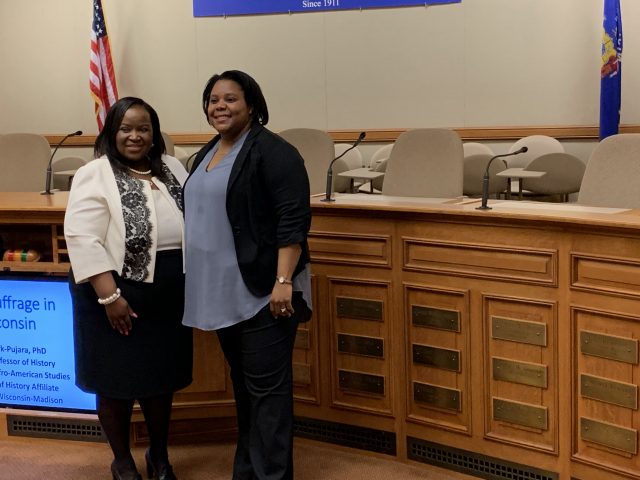Award-winning professor Christy Clark-Pujara, Ph.D., presented on the history of voting rights for Black men at the Capitol yesterday as part of a series of events hosted by the Wisconsin Legislative Black Caucus.
Clark-Pujara’s research as a historian focuses on the experiences of black people in French and British North America in the 17th, 18th and early 19th centuries, particularly studying hidden and unexplored histories of African Americans in the North and Midwest. She shared the stories of the first African descendants in the area. Representative Shelia Stubbs (D-Madison) introduced the professor as yesterday’s speaker in an ongoing series of presentation, panels and discussions honoring Black History Month.
“The story of Black people in Wisconsin is relatively recent history,” Clark-Pajara said.
She said learning about the political struggles of the past informs how we contextualize issues today. Clark-Pajara thinks framing the political discussion around voting must account the historical struggle for the Black vote.
The City of Madison is known for its progressiveness; however, the state has not always been that way. Wisconsin, like many other states in the North, benefitted from a slave-driven economy, Clark-Pajara explained.
“Overall, white Wisconsinites held very few or a few practiced slavery. However, race-based slavery informed white Wisconsinites’ opinions on slavery,” she said.
Clark-Pajara informed the audience that while most white Wisconsinites were anti-slavery for moral or other reasons, very few were invested in the abolitionist movement. She said the key difference between these positions includes actively working to dismantle slavery as an abolitionist. She said this should not surprise anyone considering the products created through slave labor, such as cotton, were used in industries like textiles.
“So Wisconsin was racially progressive but oppressive at the same time. It was not either-or, it was and,” she said.
Clark-Pajara said the debate over black male suffrage became a conversation immediately when Wisconsin became a state in 1848. She explained Black suffrage was both affirmed and denied by White residents but the debate over the issue revealed overt racism in the territorial government.
She also said the state’s second constitution explicitly banned Black men from voting, and women of all races were often excluded from political activities. In 1848, only white citizens of the United States, white persons of foreign birth who shall declare their intention to become citizens and Native men who are citizens of the United States who don’t live on tribal lands and denounce all tribal affiliations could vote.
“The standard is maleness and whiteness. That’s who gets to decide what the state is going to look like,” Clark-Pajara said.
She also discussed the 1865 Referendum Vote on Black Male Suffrage, explaining 54 percent opposed and 46 percent voted in favor of Black men voting. Clark-Pajara also referenced civil rights and community leader Ezekiel Gillespie’s landmark case securing voting rights for African Americans; however, the decision by the state supreme court was based on a technicality. She explained abstained votes from 1849 referendum on the issue were counted as “no.”
Clark-Pajara said to think about voting only in the present is problematic. She said we have to ask ourselves “how are we doing this,” “why are we doing this” and “who does it affect” while referencing the past to see how certain decisions have affected populations before.
“History is personal. It’s about the here and now, who we think of as worthy,” Clark-Pajara said.


































